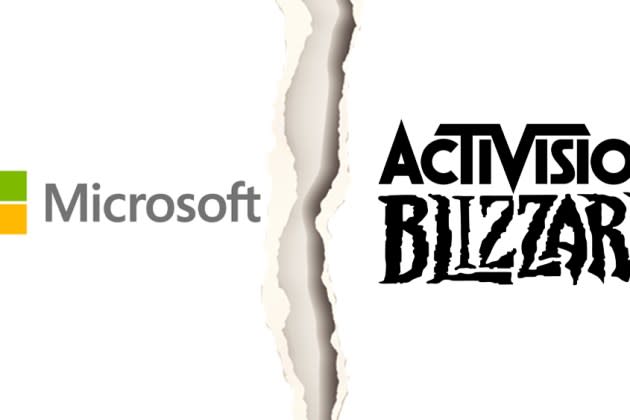FTC To Appeal Judge’s Ruling That Cleared Way For Microsoft-Activision Merger — Update

UPDATE: The Federal Trade Commission is appealing a federal judge’s ruling that clears the way for Microsoft to complete its $69 billion merger with Activision.
The FTC filed a notice of appeal in the federal court on Wednesday.
More from Deadline
Microsoft/Activision: EU Goes Against The Grain By Waving Through $69B Takeover
Microsoft's $68.7BN Takeover Of 'Call Of Duty' Maker Activision Blizzard Blocked By UK Regulator
U.S. District Judge Jacqueline Scott Corley largely rejected the government’s arguments against the Microsoft-Activision deal, including that it would lead to the combined company withholding popular titles like Call of Duty from rivals.
The deal still faces opposition from UK regulators, but Microsoft and Activision are looking at modifying the terms of their combination to appease concerns.
The merger proposal has a July 18 termination date.
The ruling was a setback to FTC chairwoman Lina Khan, who has tried to take a harder line against corporate consolidation in tech and other industries. She is scheduled to testify on Thursday at an oversight hearing before the House Judiciary Committee.
PREVIOUSLY, July 11: A federal judge has rejected the Federal Trade Commission’s effort to stop Microsoft’s acquisition of Activision, ruling that the government had not shown that the transaction would substantially lessen competition.
“The FTC has not shown it is likely to succeed on its assertion the combined firm will probably pull Call of Duty from Sony PlayStation, or that its ownership of Activision content will substantially lessen competition in the video game library subscription and cloud gaming markets,” U.S. District Judge Jacqueline Scott Corley wrote in her opinion (read it here).
The FTC launched an administrative action to block the $69 billion deal in December, arguing that the vertical merger would give Microsoft too much control over top videogame franchises. An administrative trial is scheduled to begin on Aug. 2.
The judge’s decision was to deny a preliminary injunction pending completion of FTC administrative action. Douglas Farrar, spokesperson for the agency, said in a statement, “We are disappointed in this outcome given the clear threat this merger poses to open competition in cloud gaming, subscription services, and consoles. In the coming days we’ll be announcing our next step to continue our fight to preserve competition and protect consumers.”
The transaction also faces opposition from the UK’s Competition and Markets Authority. Brad Smith, vice chair and president of Microsoft, said that they “are considering how the transaction might be modified” in order to address the UK body’s concerns. Microsoft and Activision have in the meantime stayed their appeal of the CMA’s decision to block the deal.
Phil Spencer, the CEO of Microsoft Gaming, said in a statement, “The evidence showed the Activision Blizzard deal is good for the industry and the FTC’s claims about console switching, multi-game subscription services, and cloud don’t reflect the realities of the gaming market.”
The FTC had sought the injunction to halt the merger before a July 18 termination date. Microsoft is obligated to pay Activision a $3 billion termination fee, the judge noted.
The FTC argued that the merger would lessen competition because the combined entity would likely have the incentive to inhibit access to games like Call of Duty by rivals like Sony. In other words, Microsoft could make the Xbox exclusive to that game or other popular titles.
But the judge wrote that under antitrust law, it “is not enough that a merger might lessen competition—the FTC must show the merger will probably substantially lessen competition. That the combined firm has more of an incentive than an independent Activision says nothing about whether the combination will ‘substantially’ lessen competition.”
Corley noted that after the transaction was announced, Microsoft’s Satya Nadella and Phil Spencer “spoke with Sony CEO Kenichiro Yoshida to emphasize Microsoft’s commitment to enter a new agreement to extend Activision’s obligation to ship Call of Duty at parity on PlayStation.” She also noted that Microsoft took steps to expand Call of Duty to other platforms, including a deal to bring the game to Nintendo’s Switch.
“All of this conduct is inconsistent with an intent to foreclose,” the judge wrote. The judge also noted that the deal’s evaluation model depended on sales of Activision titles to Playstation and other non-Microsoft platforms.
She wrote that the FTC “has not identified any instance in which an established multiplayer, multi- platform game with cross-play, that is, a game that shares Call of Duty’s characteristics, has been withdrawn from millions of gamers and made exclusive.”
Best of Deadline
2023 Premiere Dates For New & Returning Series On Broadcast, Cable & Streaming
Hollywood & Media Deaths In 2023: Photo Gallery & Obituaries
Sign up for Deadline's Newsletter. For the latest news, follow us on Facebook, Twitter, and Instagram.


